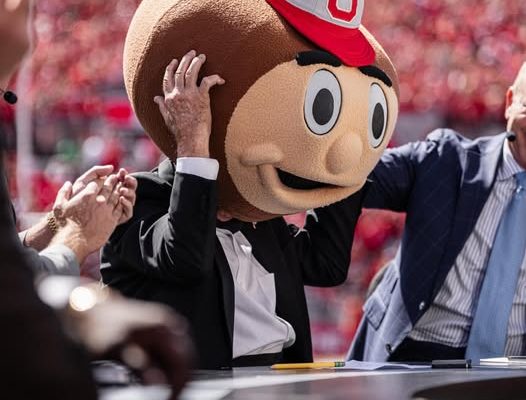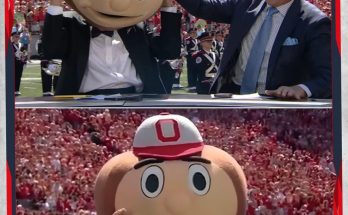There are moments in sports that go far beyond the action on the field, the scoreboard, or even the championships that define seasons. Some moments are about people, about the connections they build over years of devotion to a team, a sport, or a community. Few individuals embody this truth more than Lee Corso, the legendary broadcaster and beloved personality whose career has made him one of the most recognizable faces in college football. Recently, fans made their voices heard in an emotional display of appreciation, shouting “We love ya, Coach Corso — Go Bucks!” in a heartfelt tribute that transcended rivalries, generations, and traditions. It wasn’t just a chant; it was a message of gratitude, respect, and admiration for a man whose influence has touched millions of lives across decades of college football Saturdays.
The sight of Corso has long been synonymous with the pageantry of college football. His iconic mascot headgear picks, his quick wit, and his ability to blend humor with deep football knowledge have made him a fixture on ESPN’s “College GameDay.” For over 35 years, Corso has been a guiding voice of college football fandom, setting the tone for Saturdays and serving as the unofficial ambassador of the sport. Fans have laughed with him, argued with him, and even groaned at his predictions, but through it all, he has been an essential part of the college football experience. To shout “We love ya, Coach Corso” is not just about recognizing his work as a broadcaster—it is about acknowledging the role he has played in shaping the culture of college football itself.
The particular chant of “Go Bucks” adds an even deeper layer of meaning. Ohio State, one of the most storied programs in college football history, represents not just a fan base but a symbol of the sport’s enduring traditions. Corso’s connection with the Buckeye faithful has been notable throughout his career. Whether donning Brutus the Buckeye’s mascot head on set or playfully stoking the fire in Ohio State vs. Michigan debates, Corso has always understood the magnitude of that rivalry and the passion of Ohio State’s fan base. To hear Ohio State fans combine their love for their team with their love for Corso created a moment that resonated far beyond Columbus—it was symbolic of how Corso’s charm unites fans, no matter their loyalties.
What makes this tribute even more powerful is the timing. In recent years, Corso’s health struggles have been well-documented, and he has had to scale back some of his broadcasting duties. Each appearance he makes on GameDay now feels more precious, more appreciated by fans who understand that his time on the stage is finite. When fans shout “We love ya,” they aren’t just cheering for the Corso who makes them laugh with headgear antics—they are honoring the man who has shown resilience, courage, and joy even in the face of challenges. In a way, these tributes are the fans’ opportunity to give back the same energy and affection that Corso has poured into the sport for decades.
The phrase “Beloved Icon” fits Corso perfectly. He has never been just a broadcaster; he is a character, a mentor, a historian of the game, and above all, a fan himself. His career has spanned coaching stints, television fame, and a legacy that will live long after he steps away from the spotlight. For many younger fans, he has been the first voice they heard when falling in love with college football. For older fans, he is a constant—a reminder of how the sport has grown but also how some traditions never change. The warmth that radiates from fans chanting his name reflects the universality of his appeal. He doesn’t belong to one school, one conference, or one team. He belongs to the sport itself, and the sport, in turn, belongs to the people.
College football is, at its heart, about community. Saturdays are about more than touchdowns and tackles; they are about gathering, celebrating, and creating memories. Corso has been part of countless fans’ traditions, whether that meant tuning in early Saturday morning to watch GameDay or waiting with anticipation to see which mascot head he would choose. His unpredictability became part of the rhythm of the sport, and his joy for the game has been contagious. That’s why when fans chant “We love ya, Coach Corso,” they aren’t just cheering—they are acknowledging the countless Saturdays he has made brighter, the countless laughs he has delivered, and the countless times he has reminded them why they love college football.
It’s also worth noting the unique relationship between Corso and Ohio State fans. The Buckeyes have been at the center of many of his most memorable GameDay moments, from bold predictions to unforgettable mascot picks. In some ways, Corso has mirrored the Buckeye spirit—bold, energetic, and unafraid to stir the pot. His playful personality has always meshed with the Ohio State fan base, and the chant of “Go Bucks” alongside his name is an acknowledgment that he has become part of their family. For Buckeye fans, celebrating Corso isn’t about rivalry or debate; it’s about embracing someone who has always embraced them.
This kind of tribute also reveals something deeper about the role of figures like Corso in sports culture. Fans don’t just follow games for scores; they follow for stories, personalities, and connections. Corso has been a storyteller in the truest sense, using humor, tradition, and sometimes theatrics to elevate college football beyond just sport. He has created narratives that stick, moments that linger, and memories that endure. In many ways, fans shouting their love for him is their way of saying, “Thank you for making our story richer.”
As Corso’s career winds down, moments like these become more and more important. They are reminders of how sports legends should be honored while they are still here to hear it. Too often, tributes come after the fact, when the person is no longer around to feel the impact of their legacy. That is what makes this chant so meaningful—it was in real time, with real emotion, and directed toward someone who has spent his life giving back to fans. Corso, ever the showman, surely felt that love, and fans surely hoped that he knew just how much he means to them.
But beyond just Corso himself, this moment speaks to something larger: the importance of cherishing the human side of sports. Yes, Corso is a broadcaster, a public figure, and a college football icon. But he is also a man who has shown vulnerability, fought through challenges, and continued to bring joy. In shouting “We love ya,” fans weren’t just praising the entertainer—they were expressing affection for the person. It’s a reminder that sports are at their best when they celebrate not just victories and trophies but humanity itself.
Looking ahead, Corso’s legacy will endure in ways both big and small. His headgear tradition will live on, his quotes will be remembered, and his influence will be felt in every corner of college football. But perhaps the most enduring part of his legacy is the love he has inspired. Fans may disagree on teams, plays, or rankings, but they agree on one thing: Coach Corso is beloved. That chant of “We love ya, Coach Corso — Go Bucks!” will echo long after the moment passes, not just as a memory but as a symbol of what he has meant to the sport.
The scene was not about Ohio State alone, nor was it about ESPN or even college football as an institution. It was about people. It was about fans recognizing a man who has made them smile for years, who has helped make college football Saturdays special, and who has become part of their lives in ways they may not even fully realize. For decades, Corso has told fans “Not so fast, my friend,” with a mischievous grin. This time, the fans got the last word, telling him with one voice: “We love ya.” And that is perhaps the highest tribute any sports figure can ever receive.
In the end, the chant was more than a cheer. It was a love letter from the fans to a man who has embodied the joy of the sport. It was a recognition that some icons aren’t measured in wins or statistics but in smiles, memories, and shared traditions. It was the sport’s way of saying thank you to one of its greatest ambassadors. And as long as college football is played, as long as fans gather on crisp autumn Saturdays, and as long as stories are told about the magic of the game, the name Lee Corso will live on—not just as a broadcaster, not just as a coach, but as a beloved icon who will always be part of the heartbeat of college football.



